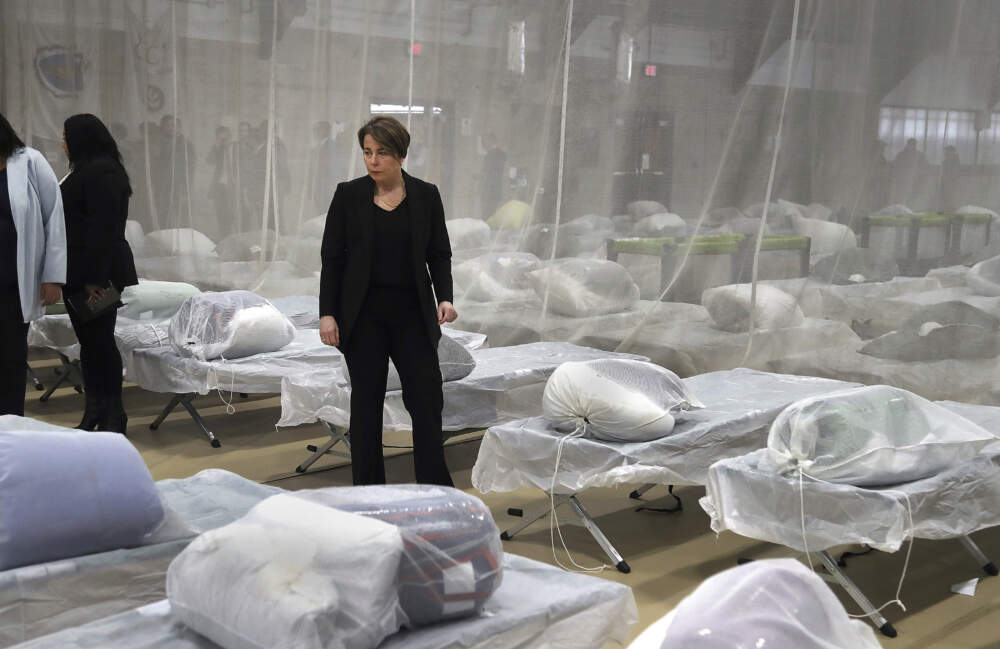Advertisement
Boston's Morning Newsletter
How the latest Mass. House and Senate shelter funding bills differ

Editor's Note: This is an excerpt from WBUR's daily morning newsletter, WBUR Today. If you like what you read and want it in your inbox, sign up here.
My bracket is already pretty beaten up thanks to this guy and these refs, but at least the Holy Cross women’s team is advancing to play — gulp — Caitlin Clark and Iowa. (The nationally televised game tips off tomorrow at 3 p.m. on ABC).
But first, the news:
Déjà vu: We’re headed toward another State House showdown over a bill to keep funding Massachusetts’ overwhelmed family shelter system (and make a few other policy changes, too). As WBUR’s Walter Wuthmann reports, the state Senate passed a supplemental budget last night that would allocate more money to the shelter system and limit how long people can stay. But there are some important differences compared to the bill the House passed earlier this month — meaning the two chambers will have to negotiate a deal.
- The Senate’s bill takes a slightly different approach to shelter stay time limits. Both could push individuals out of the system as soon as after nine months. However, the House bill would cap all stays at 12 months, while the Senate bill would allow 90-day extensions to residents who meet certain criteria (such as veterans, single parents of kids with disabilities and those who need an extension to avoid losing a work permit.)
- Go deeper: Advocates are worried about the ramifications of the proposed shelter time limits, especially since the average stay in the family shelter system is 13 to 14 months.
- The Senate also added a provision yesterday to require safety reviews at all state-run emergency shelters, in the wake of an alleged rape at a Rockland hotel shelter last week.
- Meanwhile, the House bill would use $245 million from a state savings account of surplus money to keep the shelter system funded through June. The Senate bill would let Gov. Maura Healey’s administration take $825 million from the account — basically emptying it — to fund the system for the next 15 months.
- Like last fall’s supplemental budget, there are some miscellaneous policy items unrelated to the shelter system. Unlike the House, the Senate bill would let the pandemic-era rule allowing restaurants to sell to-go beer, wine and liquor expire at the end of this month.
Busy day: The state Senate also passed a bill yesterday that would outlaw so-called “revenge porn” in Massachusetts. That means non-consensually sharing an image of someone nude or semi-nude to shame them or to extract a ransom, as WBUR’s Dave Faneuf reports. If passed, adult violators could face jail time of up to 2.5 years for first-time offenses. “Let this legislation make a difference so that everybody knows this is not acceptable,” said state Sen. John Keenan. “It is criminal and there will be a consequence.”
- Flashback: You may remember this was a big priority for former Gov. Charlie Baker. However, the House and Senate couldn’t work out a compromise before the end of his term. This time around, Keenan said there’s only minor differences between the Senate bill and the version the House passed in January (and it’s around which agency creates a teen diversion program). He’s optimistic the legislation will make it to Healey’s desk in the next few months.
- Zoom out: Massachusetts and South Carolina are currently the only states left in the country without laws against revenge porn.
In memoriam: Sarah-Ann Shaw, Boston’s first Black woman TV reporter, has died. WBZ — where Shaw started in 1969 — announced the 90-year-old, lifelong Roxbury resident died at her home yesterday.
- Longtime colleague Ron Mitchell spoke with WBUR’s All Things Considered host Lisa Mullins about Shaw’s trailblazing reporting and selfless work. Read highlights from the interview here.
Heads up: The Orange Line is fully open again, but shuttle buses will be back to replace Red Line service between Broadway and North Quincy, and on all of the Ashmont branch for the next three weekends (March 23-24, March 30-31 and April 6-7).
- The diversion is so crews can tear down the Dorchester Avenue Bridge, which is being replaced (and slated to reopen to cars this fall). Neighbors, expect some demolition noise in the meantime.
PSA: If you have any bottled water from Simpson Spring Company, don’t drink it. State officials say the Easton-based company’s water has too much PFAS in it — which is bad.
P.S.— What could help restore coral reefs, according to a recent study from Woods Hole? Take our Boston News Quiz and test your knowledge of this week’s stories compared to other WBUR readers.
